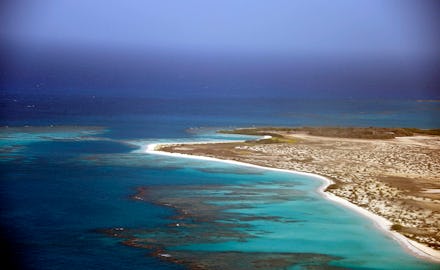The Caribbean Sea Is Emitting a Mysterious Sound — Here's What's Causing It

A mysterious low whistle coming from the Caribbean Sea is unlike anything scientists have ever heard.
The pitch is too low for humans to hear, but scientists have detected the noise all the way from space by recording oscillations in Earth's gravitational field.
Here's what a higher-pitched version sounds like:
Researchers first noticed the sound while studying a region of the Caribbean Sea that forms currents that feed into the Gulf Stream. They were studying models to try and predict how water movement would influence future climate.
The models in this one region didn't make any sense. "We were looking at ocean pressure through models for quite different reasons, and this region just didn't work," one of the researchers, Chris Hughes, told Gizmodo. "It felt like a sore thumb."
What's causing the whistle?
The sound is coming from what researchers call the "Rossby wave." It's a current that travels west across the oceans, seems to disappear when it hits the Caribbean and then mysteriously reappears on its eastern side months later. The weird phenomenon is nicknamed the "Rossby wormhole."
It turns out that the wave doesn't disappear at all. It interacts with the ocean floor, creating this low whistle.
"When you blow into a whistle, the jet of air becomes unstable and excites the resonant sound wave which fits into the whistle cavity," Hughes explained in a statement. "Because the whistle is open, the sound radiates out so you can hear it."
"Similarly, an ocean current flowing through the Caribbean Sea becomes unstable and excites a resonance of a rather strange kind of ocean wave called a Rossby wave," he added. "Because the Caribbean Sea is partly open, this causes an exchange of water with the rest of the ocean which allows us to 'hear' the resonance using gravity measurements."
The whole Caribbean is a huge whistle, so the sound it produces is extremely low-pitched.
The team will continue to study the sound, now dubbed the "Rossby whistle," to investigate how it impacts the North Atlantic ocean.
Read more: